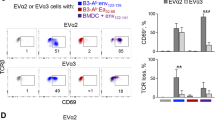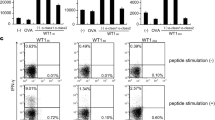Abstract
TCR of CD8 T cells recognizes peptides of 8–9 amino acids in length (epitope) complexed with MHC class I. Peptide ligands differing from an epitope by one or two amino acids are thought to modulate the immune response specific to that epitope. H60 is a minor histocompatibility antigen for which the specific CD8 T-cell response dominates during alloresponse after MHC-matched allogeneic transplantation. In the present study, we developed a transgenic mouse (designated H60H Tg) expressing a variant of H60, designated H60H, in which the arginine residue at position 4 of the H60 epitope sequence (LTFNYRNL) is replaced by a histidine residue (LTFHYRNL). Immunization of female C57BL/6 mice with splenocytes from male H60H Tg induced a CD8 T cell primary response and memory response after re-challenge. The response was CD4 help-dependent, demonstrating the potency of H60H as a cellular antigen. The response induced by the H60H cellular antigen was comparable to that induced by H60 in its peak magnitude and overall immune kinetics. H60H challenge recruited broadly diverse TCRs to the specific response, sha** a TCR repertoire different from that of the natural H60 epitope. However, some of the TCRs did overlap between the H60H- and H60-specific CD8 T cells, suggesting that H60H might modulate the H60-specific response. These results may provide a basis for the modulation of the H60-specific CD8 T-cell response.
Similar content being viewed by others
References
Ashton-Rickardt, P.G., Van Kaer, L., Schumacher, T.N., Ploegh, H.L., and Tonegawa, S. (1993a). Peptide contributes to the specificity of positive selection of CD8+ T cells in the thymus. Cell 73, 1041–1049.
Ashton-Rickardt, P.G., Van Kaer, L., Schumacher, T.N., Ploegh, H.L., and Tonegawa, S. (1993b). Repertoire-determining role of peptide in the positive selection of CD8+ T cells. Immunol. Rev. 135, 157–182.
Ashton-Rickardt, P.G., Bandeira, A., Delaney, J.R., Van Kaer, L., Pircher, H.P., Zinkernagel, R.M., and Tonegawa, S. (1994). Evidence for a differential avidity model of T cell selection in the thymus. Cell 76, 651–663.
Boesteanu, A., Brehm, M., Mylin, L.M., Christianson, G.J., Tevethia, S.S., Roopenian, D.C., and Joyce, S. (1998). A molecular basis for how a single TCR interfaces multiple ligands. J. Immunol. 161, 4719–4727.
Borghans, J.A., and De Boer, R.J. (1998). Crossreactivity of the Tcell receptor. Immunol. Today 19, 428–429.
Choi, E.Y., Yoshimura, Y., Christianson, G.J., Sproule, T.J., Malarkannan, S., Shastri, N., Joyce, S., and Roopenian, D.C. (2001). Quantitative analysis of the immune response to mouse non-MHC transplantation antigens in vivo: the H60 histocompatibility antigen dominates over all others. J. Immunol. 166, 4370–4379.
Choi, E.Y., Christianson, G.J., Yoshimura, Y., Jung, N., Sproule, T.J., Malarkannan, S., Joyce, S., and Roopenian, D.C. (2002a). Real-time T-cell profiling identifies H60 as a major minor histocompatibility antigen in murine graft-versus-host disease. Blood 100, 4259–4265.
Choi, E.Y., Christianson, G.J., Yoshimura, Y., Sproule, T.J., Jung, N., Joyce, S., and Roopenian, D.C. (2002b). Immunodominance of H60 is caused by an abnormally high precursor T cell pool directed against its unique minor histocompatibility antigen peptide. Immunity 17, 593–603.
Choi, J.H., Ryu, S.J., Jung, K.M., Kim, S., Chang, J., Kim, T.W., and Choi, E.Y. (2009). TCR diversity of H60-specific CD8 T cells during the response evolution and influence of CD4 help. Transplantation 87, 1609–1616.
Choi, J.H., Yoon, H., Min, C.K., and Choi, E.Y. (2011). Effects of pre-conditioning dose on the immune kinetics and cytokine production in the leukocytes infiltrating GVHD tissues after MHC-matched transplantation. Immune. Netw. 11, 68–78.
Daniels, M.A., Teixeiro, E., Gill, J., Hausmann, B., Roubaty, D., Holmberg, K., Werlen, G., Hollander, G.A., Gascoigne, N.R., and Palmer, E. (2006). Thymic selection threshold defined by compartmentalization of Ras/MAPK signalling. Nature 444, 724–729.
de Haan, E.C., Moret, E.E., Wagenaar-Hilbers, J.P., Liskamp, R.M., and Wauben, M.H. (2005). Possibilities and limitations in the rational design of modified peptides for T cell mediated immunotherapy. Mol. Immunol. 42, 365–373.
Garcia, K.C., Degano, M., Stanfield, R.L., Brunmark, A., Jackson, M.R., Peterson, P.A., Teyton, L., and Wilson, I.A. (1996). An alphabeta T cell receptor structure at 2.5 A and its orientation in the TCR-MHC complex. Science 274, 209–219.
Jensen, K.D., Sercarz, E.E., and Gabaglia, C.R. (2009). Altered peptide ligands can modify the Th2 T cell response to the immunodominant 161–175 peptide of LACK (Leishmania homolog for the receptor of activated C kinase). Mol. Immunol. 46, 366–374.
Jeon, J.Y., Jung, K.M., Chang, J., and Choi, E.Y. (2011). Characterization of CTL clones specific for single antigen, H60 minor histocompatibility antigen. Immune. Netw. 11, 100–106.
Jung, K.M., and Choi, E.Y. (2007). Role for CD40 and CD40L expression in generating CD8 T cell response to minor histocompatibility antigen, H60. Immune. Netw. 7, 173–178.
Kersh, G.J., and Allen, P.M. (1996). Essential flexibility in the T-cell recognition of antigen. Nature 380, 495–498.
Kumar, V., Bhardwaj, V., Soares, L., Alexander, J., Sette, A., and Sercarz, E. (1995). Major histocompatibility complex binding affity of an antigenic determinant is crucial for the differential secretion of interleukin 4/5 or interferon gamma by T cells. Proc. Natl. Acad. Sci. USA 92, 9510–9514.
Malarkannan, S., Shih, P.P., Eden, P.A., Horng, T., Zuberi, A.R., Christianson, G., Roopenian, D., and Shastri, N. (1998). The molecular and functional characterization of a dominant minor H antigen, H60. J. Immunol. 161, 3501–3509.
Malherbe, L., Filippi, C., Julia, V., Foucras, G., Moro, M., Appel, H., Wucherpfennig, K., Guery, J.C., and Glaichenhaus, N. (2000). Selective activation and expansion of high-affinity CD4+ T cells in resistant mice upon infection with Leishmania major. Immunity 13, 771–782.
Malherbe, L., Hausl, C., Teyton, L., and McHeyzer-Williams, M.G. (2004). Clonal selection of helper T cells is determined by an affinity threshold with no further skewing of TCR binding properties. Immunity 21, 669–679.
Mason, D. (1998). A very high level of crossreactivity is an essential feature of the T-cell receptor. Immunol. Today 19, 395–404.
Roopenian, D., Choi, E.Y., and Brown, A. (2002). The immunogenoics of minor histocompatibility antigens. Immunol. Rev. 190, 86–94.
Russell, P.S., Chase, C.M., Madsen, J.C., Hirohashi, T., Cornell, L.D., Sproule, T.J., Colvin, R.B., and Roopenian, D.C. (2011). Coronary artery disease from isolated non-H2-determined incom-patibilities in transplanted mouse hearts. Transplantation 91, 847–852.
Ryu, S., Jung, K., Yoo, H., Kim, T., Kim, S., Chang, J., and Choi, E. (2009). Cognate CD4 help is essential for the reactivation and expansion of CD8 memory T cells directed against the haematopoietic cell-specific dominant minor histocompatibility antigen, H60. Blood 113, 4273–4280.
Sebzda, E., Wallace, V.A., Mayer, J., Yeung, R.S., Mak, T.W., and Ohashi, P.S. (1994). Positive and negative thymocyte selection induced by different concentrations of a single peptide. Science 263, 1615–1618.
Strausbauch, M.A., Nevala, W.K., Roopenian, D.C., Stefanski, H.E., and Wettstein, P.J. (1998). Identification of mimotopes for the H4 minor histocompatibility antigen. Int. Immunol. 10, 421–434.
Wauben, M.H., Boog, C.J., van der Zee, R., Joosten, I., Schlief, A., and van Eden, W. (1992). Disease inhibition by major histocompatibility complex binding peptide analogues of disease-associated epitopes: more than blocking alone. J. Exp. Med. 176, 667–677.
Wauben, M.H., Joosten, I., Schlief, A., van der Zee, R., Boog, C.J., and van Eden, W. (1994). Inhibition of experimental autoimmune encephalomyelitis by MHC class II binding competitor peptides depends on the relative MHC binding affinity of the diseaseinducing peptide. J. Immunol. 152, 4211–4220.
Wilson, D.B., Wilson, D.H., Schroder, K., Pinilla, C., Blondelle, S., Houghten, R.A., and Garcia, K.C. (2004). Specificity and degeneracy of T cells. Mol. Immunol. 40, 1047–1055.
Wucherpfennig, K.W., Allen, P.M., Celada, F., Cohen, I.R., De Boer, R., Garcia, K.C., Goldstein, B., Greenspan, R., Hafler, D., Hodgkin, P., et al. (2007). Polyspecificity of T cell and B cell receptor recognition. Semin. Immunol. 19, 216–224.
Author information
Authors and Affiliations
Corresponding author
About this article
Cite this article
Ryu, S.J., Jeon, J.Y., Chang, J. et al. A single-amino-acid variant of the H60 CD8 epitope generates specific immunity with diverse TCR recruitment. Mol Cells 33, 393–399 (2012). https://doi.org/10.1007/s10059-012-0008-3
Received:
Revised:
Accepted:
Published:
Issue Date:
DOI: https://doi.org/10.1007/s10059-012-0008-3




